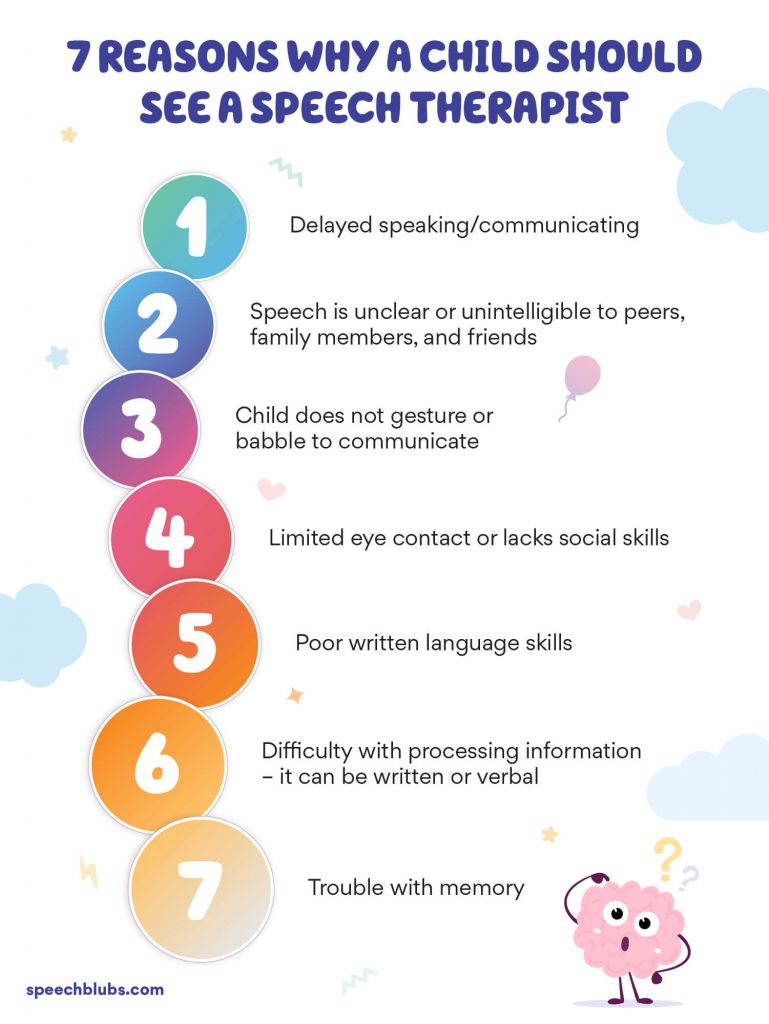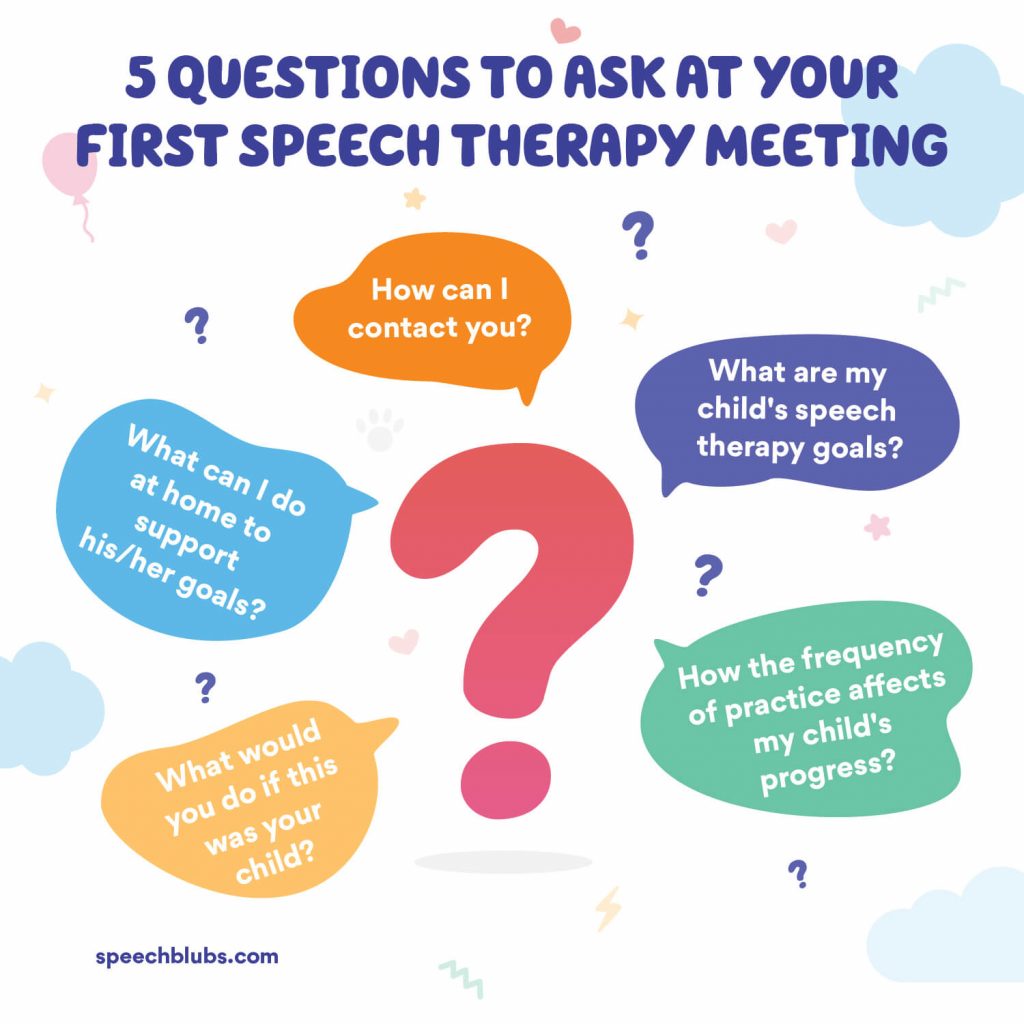Speech Therapy for Kids: An All-in-One Guide
Jan 7, 2022 The decision to send your kid for pediatric speech therapy can be confusing, and is always difficult.
This blog attempts to: make that decision clearer and easier by first digging into the questions parents grapple with before they see a speech-language pathologist (SLP), then it explores the practical issues of seeing a therapist, then how to practice at home in between therapy sessions, and finally, how to know when to stop seeing your SLP.
Welcome to our series of “All-in-One” guides connecting blog writers around an important topic that is explored in-depth on our blog page. The subject of this guide explores everything parents need to know about SLPs and speech therapy.
Fun Speech Therapist-approved Activities
Speech Blubs is a language therapy app with more than 1,500 activities, face filters, voice-activated activities, and educational bonus videos. The more you practice, the more it carries over! Try the Speech Blubs app for fun and engaging therapy sessions with your little one.
Boost Your Child’s Speech Development!
Improve language & communication skills with fun learning!

The Questions to Ask if Your Child has Speech Issues
When should I take my child to a SLP?
Knowing if/when to contact a therapist is half the battle in tackling speech issues. The general rule of thumb is if your child is more than one age group behind, then you should seek help. The following blog gives the basics about what a speech therapist does, and lists the milestones that children generally meet. Use this list as a comparison marker for deciding about your child. Check this blog: When is it Time to Go to a Speech Therapist?
Recommended article
More briefly, check out this list: There are several reasons why a child should receive services:

What does a Pediatric SLP do? What will my first visit look like?
A speech pathologist, according to the American Speech-Language-Hearing Association (ASHA) says they are “experts in communication . . . (who) treat many types of communication and swallowing problems.” Our blog, Pediatric Speech Therapy Appointments describes in more detail what SLPs do, what will happen at a first appointment, and answers if it’s ok to go into the session with your child. Then, the blog gives practical suggestions for parents to be prepared before they arrive. These are key for maximizing parent’s time with the therapist.
Recommended article
Pediatric Speech Therapy Appointments

What will an SLP ask me?
Many parents aren’t great communicators with doctors. They absolutely know what’s wrong, but have trouble communicating their thoughts. It’s not surprising that most parents don’t understand the terminology that therapists use. This is no one’s fault, these can be complex issues.
This next blog tries to remedy that situation by listing the issues that therapists will be interested in, and most likely ask you. The blog also lists common words used by therapists so you’ll know what the heck they’re talking about before you arrive for a session. Check out: 25 Speech and Language Terms Every Parent Should Know Before Talking to A Pediatrician. You’ll be much more relaxed going in.
Recommended article
25 Speech and Language Terms Every Parent Should Know
Of course, there are many tests out there that a therapist may choose for your child, but parents should be aware of them to help guide the discussion. Check out this blog for an extensive list of tests, and also if your therapist believes that sight or hearing issues might be the cause.
Recommended article
Testing for Speech and Language Therapy
I Know I Need an SLP, What Now?
Rules and Regs in one spot
Well, there are rules and regulations for almost everything regarding SLPs, which can be found on ASHA’s website. A more general guide for getting started in this process is in this blog:
Recommended article
Parents Guide to Speech and Language Pathology
What to do about the “DWL” (Dreaded Waiting List)
Ok, let’s call it like we see it. There are just not enough speech therapists! The waiting time to see one can be months or more. Every speech professional will say that early intervention is the KEY to helping your child improve. The problem is, early intervention can become late intervention while you’re at home waiting for the only therapist in town to carve out some time for your little one.
This blog explores what you can do to make the most of the time you’re waiting for your speech therapy appointment. Check it out, because there are tips to getting to a therapist sooner.
Recommended article
The Dreaded Waitlist for Speech Therapy
What to Do if Your Insurance Doesn’t Cover It
Insurance companies make money by collecting money, not by paying it out to their customers. It can be quite likely that basic insurance packages don’t cover “extras” like speech therapy. This is in quotes because anyone with a child who has trouble communicating doesn’t look at therapy as an “extra,” but as a “necessity.” So, we have a blog that talks about what parents can do if their insurance doesn’t cover speech therapy. Helping your child should be a social and governmental imperative, but don’t get me started.
Recommended article
What to Do When Insurance Won’t Cover Your Speech Therapy Costs
Setting Goals and Practice At-home for Success
How to set goals for speech therapy?
“Speech therapy at home? How am I going to schedule that?” How do parents get started? “This isn’t my area of expertise, what do I know about speech therapy?” All valid points and questions. Speech Blubs’ SLP Natalie Barnes from Cape Town, South Africa has laid it all out on how to get started with speech therapy at home. She takes the stress and mystery out of figuring out this process. Make your life a little easier.
Recommended article
Setting Realistic Therapy Goals
Working on Your SLP’s Goals at Home
Any SLP worth her/his salt will give you homework after a session, so if they don’t, be sure to ask for some! This homework works on specific targeted exercises that help your child achieve certain goals. Speech therapy for toddlers will include exercises to help toward those goals. Speech Blubs SLP Stacie Bennett gives great advice for working on speech therapy goals at home. This will really help.
Recommended article
Should Parents Work on Their Child’s Speech Goals at Home?
How to engage my child in home therapy practice?
Kids certainly have their own minds. Actually, once they start having opinions, speech issues or not, they may not want to use an app that is supposed to help them. They also may not want to just because you said they should/have to. This is just one reason that experts say it’s better to start them as young as possible. They are much more likely to be attracted by bright colors, face filters, or funny sounds. That said, there are some strategies that work for kids of all ages, and can be found in our article on Tips to Engage Kids in Learning. The cool thing about Speech Blubs is that once they start, they usually want to continue.
Recommended article
How to Engage Children In Speech Therapy
Get the whole family involved in home therapy!
As in all things, “it takes a village,” and that is certainly true of families. The more a child’s family is supportive, the more he/she will want to practice. Your child’s siblings, another parent, aunts and uncles, etc. can all help. The power of positivity is amazing, and works here. For more information on how to get the whole family involved (more or less), check out this blog on family involvement in speech development.
Recommended article
Involve Your Family in Your Child’s Speech Development
Other resources that can help my child?
There is some good news here. While you’re waiting for an appointment with a therapist, or if you’re in between appointments, we can point you to a LOT of help. Speech Blubs provides 1500+ games, activities, and exercises to get your child practicing targeted speech goals.
In addition, we also have a great blog that teaches you how to use music to help learn speech. In fact, ASHA (2012) reported that “music has improved a patient’s motivation, attitude, and performance in his or her speech-language therapy (The ASHA Leader, 2012).”
Recommended article
Kids Music and Speech Therapy
Congrats! Your child can talk! What’s next?
Deciding when your child is ready to stop going to speech therapy is a somewhat subjective decision that depends on your goals, your speech therapist’s goals, and your child’s engagement level. Fortunately, we have a blog to help parents with that decision when to stop speech therapy. Our SLP Natalie Barnes discusses what the research shows, what the signs are for knowing when your child is ready, and talks about “maintenance therapy.” Of course, Speech Blubs is a great tool for a fun way to maintain what your child has learned.
